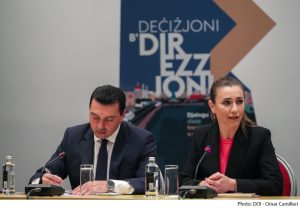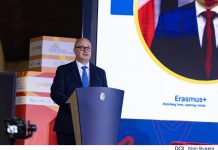The Ministry for Transport, Infrastructure and Capital Projects continued its series of meetings with main stakeholders on the efficiency of public transport and traffic mitigation. Today’s meeting was held with the Local Councils’ Association as they too play a central role in implementing the Government’s plan.
Minister Aaron Farrugia explained that through these meetings, entitled ‘Deċiżjoni b’direzzjoni: djalogu dwar trasport u mobilità’, led by Government consultant and academic Prof. Gordon Sammut, all interested parties are involved and being invited to put forward their ideas towards achieving this much-needed change in the way Malta’s people commute. He explained how the local councils are crucial partners in the implementation of Government’s vision, as they are the ones who know best the particular needs of their locality.
“We are working to define and explain the Government’s plan to all interested parties and bring forward tangible proposals that make sense. These meetings go well beyond partisan debates and are preparing a strong basis for the implementation of proposals that offer solutions for the modern challenges in mobility that the country is facing,” said Minister Farrugia.

Parliamentary Secretary Alison Zerafa Civelli said that local councils play a crucial role in ensuring that their communities have safe, accessible, and sustainable transport options that meet the needs of residents and businesses. She also explained that traffic management within towns and villages was one of the subjects discussed during the stakeholder’s consultation meetings regarding the National Strategic Vision for Local Government.
“Government is committed to addressing the challenges concerning transport and mobility through a collective effort with Local Councils and all entities concerned, by new and sustainable means, in order to create a cleaner and safer environment which will improve the quality of life of residents” concluded Zerafa Civelli.
The President of the Local Councils’ Association, Mario Fava, stressed the importance of having our country move towards alternative modes of transport while reducing its dependence on private vehicles.
“One of several measures for our country to reduce emissions faster is the use of public transport. For this to happen we must have the right infrastructure across our towns and cities. This will encourage the residents to change their mobility habits. Local Councils may contribute to reaching climate goals as well as increasing social and economic sustainability,” concluded Mr Fava.










